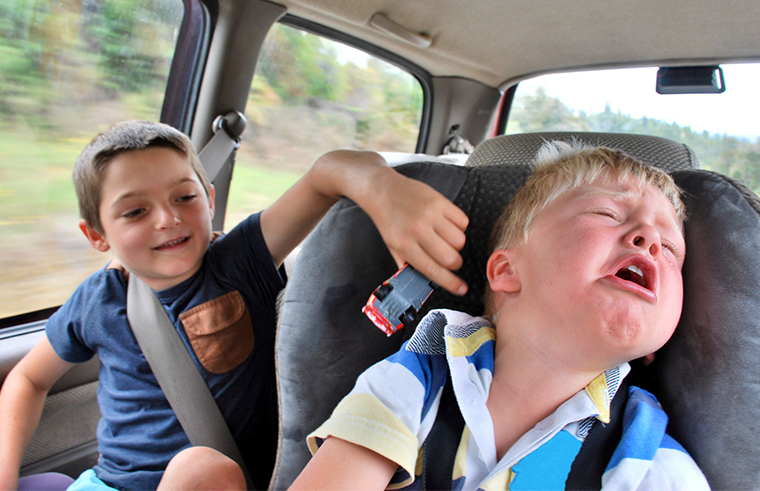Sibling rivalry: How to find calm in the storm when your kids fight

My children are now five and seven. I’ve seen them cuddle on the lounge while watching TV, I’ve watched them play imaginary games together and jump happily on the trampoline in the backyard.
I’ve also seen them fight over one child’s toe being too far on the other’s side of the lounge. Seen them belt each other over a grievance in the same imaginary game they were enjoying so much a minute before. And I often hear a tearful howl of “Muuuuuuuuuum” from another room that precedes a big conversation of who did what to whom.
Sibling rivalry can be exhausting, and difficult to untangle. Ariella Lews is a parenting educator at Kids on Track, and she has a few ideas on what’s really going on.
It starts from the minute the first sibling arrives
Some first children greet the arrival of a brother or sister with glee. There are many adorable videos on the internet to attest to this. Sometimes the excitement wears off after it becomes apparent that the baby is here to stay. Ariella says this is where sibling rivalry begins because from here on in, both children will need to share.
“They share parents, they share grandparents, they share space. From that time on, you’re asking children to always consider someone other than themselves.”
And that, for small children with developing brains, can be hard.
Listen to Ariella Lews on Feed Play Love
Understanding when the proverbial hits the fan
It can be really difficult to empathise when children fight. It can feel so incredibly petty and frustrating. I’m thinking of the times when fights have erupted over one child looking at the other, or when one child is howling to the moon while the other is looking guilty.
Firstly, Ariella says that we need to look at the context. Has the fight started in the car, after a particularly stressful morning? Are they tired and hungry? Have you been angry with them? If all of these things have added to a tense situation, it’s more likely they’ll lose their shiz if their brother looks at them the ‘wrong’ way.
Next, think about their perspective. Your first instinct may be to go to the child who’s crying, or the smallest child. But if you haven’t been there to see exactly what’s happened, don’t assume that the smallest, crying child is the victim. They are just as likely to have contributed to the bust-up as the older dry-eyed child.
Develop a few prevention strategies
Ariella says that having two children under six together for any time over fifteen minutes is likely to end in tears. To help create a more harmonious environment she suggests giving each child something separate to do.
Making sure each child has a box of toys that are theirs alone, can help define the boundaries and prevent fights over toys.
Choose your battles
Ariella advises parents that if the children aren’t hurting each other physically, the best thing you can do is to stay out of it.
She explains, “When a parent isn’t in the room, kids are forced to problem-solve themselves.” As soon as we’re there to mediate, negotiate and fix the problem, they’re not learning how to do it on their own.
Which is a relief, unless you’re worried your children will grow up hating each other.
Ariella understands that most parents hope their children will grow up to be friends. She says parents don’t need to worry that the rivalry of early years will have a lasting impact.
“A sibling is your first friend and they’re your forever friend. A sibling knows everything, they were there from day dot. While they’re still little and growing and developing, they’re exploring a lot of things that are causing the rivalry. At the same time, they are actually developing their social skills. They’re learning how to share, they’re learning how to fight, and they’re learning how to stand up for themselves. All of those are skills that they’re going to need in life.”
Phew! What a relief to know that sibling rivalry is appropriate for young children. Now all I have to do is back out of the room and let them handle it themselves.









